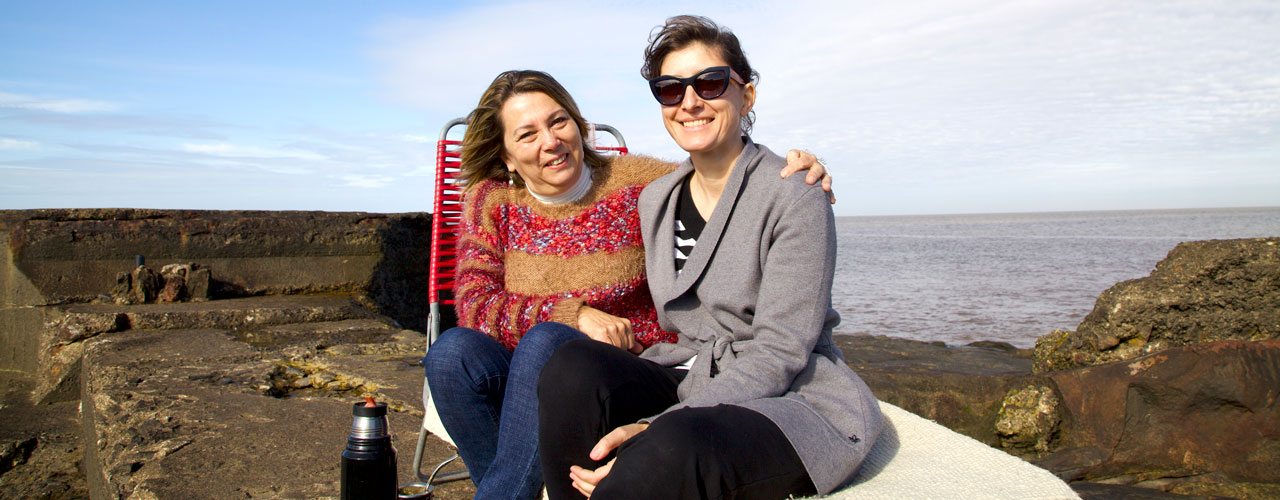
CHECKMATE
Bruna Piantino
Checkmate is an incidental film. In early 2019, I went to spend a season in Montevideo, to edit a documentary. And to integrate myself with the people of the city, I enrolled in a quick course in audiovisual directing at Casa Arbus, a school that was a block away from where I lived. The course included the production of a short film, whose theme and development would be discussed during the classes. Initially I thought about doing something related to the tiles of Montevideo, because I was enchanted by the tiles I saw in the houses, in the streets, in the monuments, quite sophisticated tiles from Spain. Montevideo is famous for its picturesque museums, one of which is the Tile Museum, where I decided to start my research.
There was an unforeseen event, on the way to the Tile Museum, I stopped for a few seconds in front of a sign. I did not have much time, as the museum to be visited was about to close. Still, I decided to go in, take the guided tour and, at the end, accept the invitation to have a mate in the Jardim dos Encontros (Encounters' Garden) in the back of the museum. I was in the Cannabis Museum. It was there that I met my first character: José Lessa, who, from the top of a ladder, was pruning a four-meter high cannabis sativa tree. That impressed me brutally, because I didn't know that this species could reach such proportions.
The image of that plant was fixed in my memory in such a way that I had no choice but to make this film. The deadline for the production of the material was very short, that is why the research went on during the preparation for the shooting, between the statements of one character and another and, in a way, filtered by the profile of each one. The biggest job was to gather information to help in the coherence of the film editing, and it was necessary to stick post-its on the wall, where subjects, categories and problems would be catalogued, which would allow me to solve the editing puzzle. I ended up finding it important to create a timeline to highlight the presence of cannabis in human history. In 6,000 years of documented history of cannabis in the world, we can say, in an optimistic perspective, that the state of prohibition will be restricted to the 20th century, since an important movement against prohibition has been evolving and gaining body in the last two decades.
When Law 19,172, which regulated the cannabis market in Uruguay, was passed in 2013, the majority of the population was against it, and it is often said that policies are implemented before the approval of the population. Currently, the panorama is different, although prejudice still exists, there is an approval that is related to individual freedom of choice and the right to full access to health. This mentality is supported by the profile of social agent and economic regulator adopted by the Uruguayan state. The most curious thing is that, even being such a small country, Uruguay is at the forefront of vanguard thinking in Latin America.
Checkmate is a totally independent production with a very low budget. The junction of these two countries, Brazil and Uruguay, is powerful in the sense that Uruguay comes in with the expertise and the vanguard mentality, and Brazil comes in with the foreign look and curiosity. This film is of more interest to countries where scientific research and political discussion about cannabis is still incipient, as is the case of Brazil, where there are few exponents in this area. This is due to the fact that there is no governmental fomentation around this agenda, first because there is a legal restriction that is supported by international agreements, and second because it is necessary to build public policies where society can have its say about a possible legalization or regulation process for cannabis in the country.
To summarize, I ended up getting involved with two topics about which I had a very shallow knowledge, which were the cannabis plant and the game of chess. The alignment of these two knowledges, these two histories, these two representations, created a great fascination for me. The question of silence during the game, the etiquette involved between the players, the precision of the moves, the virtuality of the moves, the strategic vision of the board, opened up as a simulacrum of infinite possibilities that could be projected metaphorically into the real world.
The coincidence of the process was that when I chose to insert chess into the narrative of the film, I discovered that several characters were connected to the game in their own way. In chess, there is the question of the double, each move comprises two moves, one on each side of the board. At the beginning of the game, the pieces are more symmetrical and the moves, in a way, are more predictable. But as the game progresses, the board begins to harbor a kind of chaos, and then you understand that one of the great lessons of chess is that the most important thing is what you do not see.
